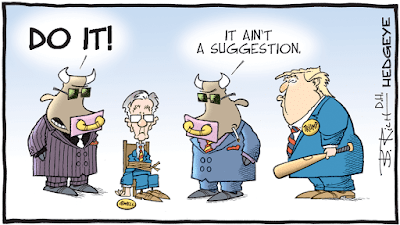No pressure! By Thomas Palley (guest blogger)The case for central bank independence is built on an intellectual two-step. Step one argues there is a problem of inflation prone government. Step two argues independence is the solution to that problem. This paper challenges that case and shows it is based on false politics and economics. The paper argues central bank independence is a product of neoliberal economics and aims to institutionalize neoliberal interests. As regards economics, independence rests on a controversial construction of macroeconomics and also fails according to its own microeconomic logic. That failure applies to both goal independence and operational independence. It is a myth to think a government can set goals for the central bank and then leave it to the bank
Topics:
Matias Vernengo considers the following as important: Central Bank Independence, Palley
This could be interesting, too:
Matias Vernengo writes Paul Davidson (1930-2024) and Post Keynesian Economics
Matias Vernengo writes Paul Davidson (1930-2024)
Matias Vernengo writes Keynes’ denial of conflict: a reply to Professor Heise’s critique
Matias Vernengo writes Dollar Hegemony and Argentina
By Thomas Palley (guest blogger)
The case for central bank independence is built on an intellectual two-step. Step one argues there is a problem of inflation prone government. Step two argues independence is the solution to that problem. This paper challenges that case and shows it is based on false politics and economics. The paper argues central bank independence is a product of neoliberal economics and aims to institutionalize neoliberal interests. As regards economics, independence rests on a controversial construction of macroeconomics and also fails according to its own microeconomic logic. That failure applies to both goal independence and operational independence. It is a myth to think a government can set goals for the central bank and then leave it to the bank to impartially and neutrally operationalize those goals. Democratic countries may still decide to implement central bank independence, but that decision is a political one with non-neutral economic and political consequences. It is a grave misrepresentation to claim independence solves a fundamental public interest economic problem, and economists make themselves accomplices by claiming it does.
Read rest here.

